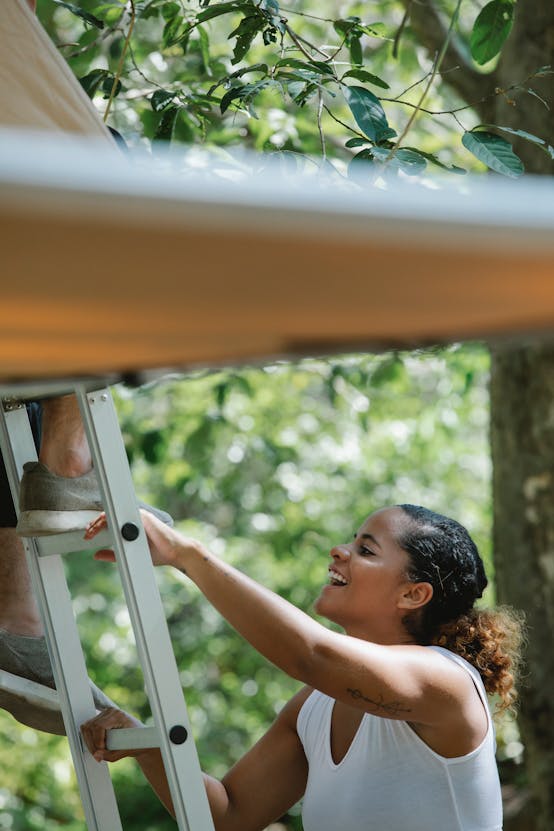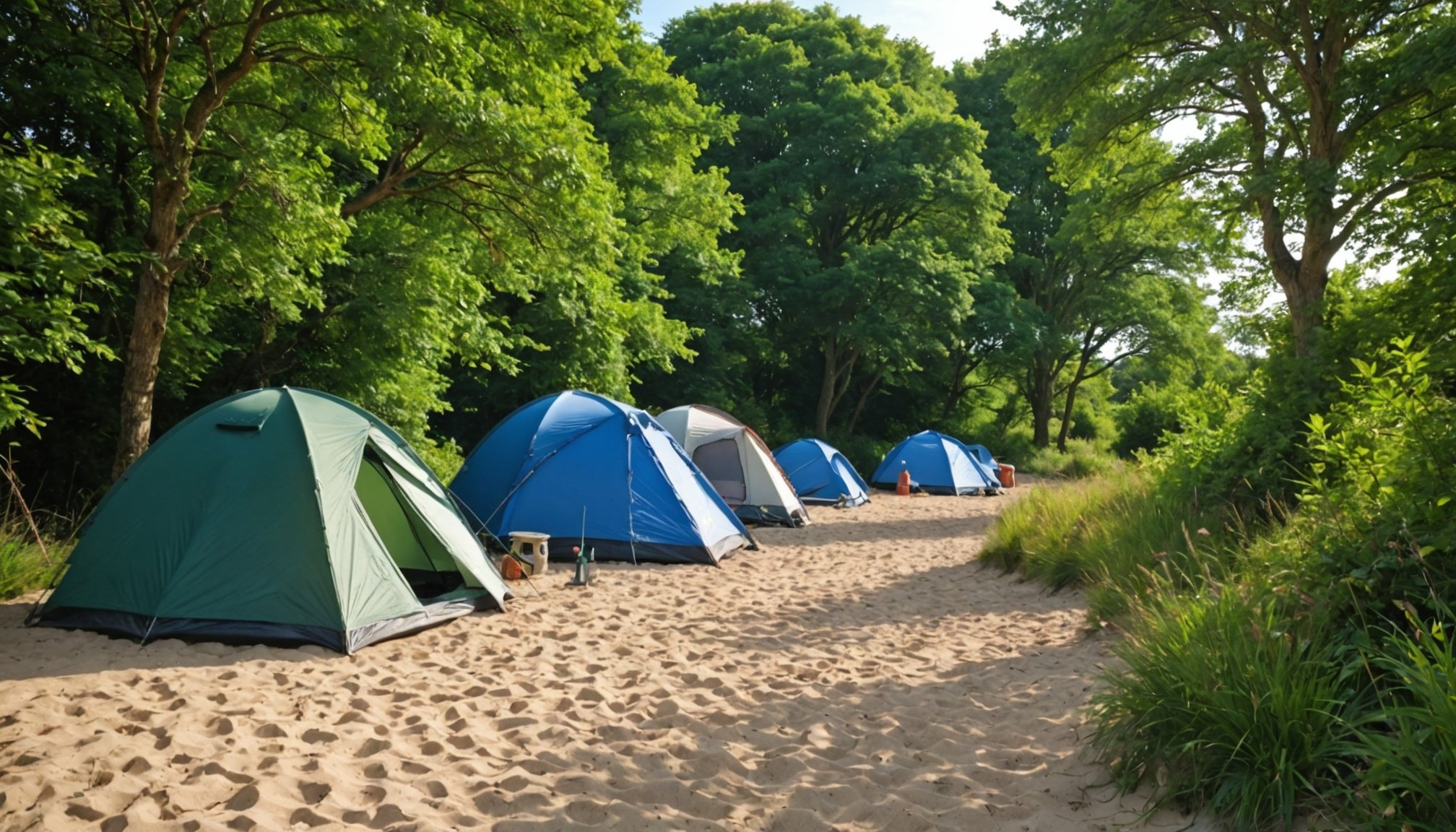Embracing Sustainable Beach Camping in the UK: Protecting Nature and Nesting Birds
As the allure of the beach and the great outdoors beckons, many of us are drawn to the idea of beach camping in the UK. However, this adventure must be balanced with the need to protect the natural environment, particularly the habitats of nesting birds. Here’s a comprehensive guide on how to enjoy sustainable beach camping while safeguarding these precious ecosystems.
Understanding the Importance of Sustainable Camping
Sustainable camping is more than just a trend; it’s a necessity in today’s world, especially when it comes to sensitive coastal ecosystems. The UK’s beaches and coastlines are home to a diverse range of wildlife, including numerous species of nesting birds that rely on these habitats for their survival.
Also to discover : The ultimate blueprint for eco-friendly camping in the uk”s wildlife sanctuaries
The Impact of Camping on Wildlife
Camping, if not done responsibly, can have significant impacts on local wildlife. Here are a few ways in which camping can affect nesting birds and other coastal creatures:
- Habitat Disturbance: Setting up campsites in sensitive areas can disturb the natural habitats of birds and other wildlife, causing them to abandon their nests or migrate to other areas.
- Noise Pollution: The noise from campers can scare birds away from their nests, leaving their eggs or chicks vulnerable to predators.
- Waste and Litter: Improper disposal of waste can lead to pollution, harming both the birds and the broader ecosystem.
- Light Pollution: Artificial light can disrupt the natural behaviors of nocturnal birds and other creatures.
Best Practices for Sustainable Beach Camping
To ensure that your beach camping adventure is both enjoyable and sustainable, here are some best practices to follow:
Have you seen this : Unveil exciting uk campsites perfect for adventurous scuba diving experiences!
Choose Eco-Friendly Campsites
Opt for campsites that have a strong commitment to sustainability. For example, Drummohr Camping & Glamping in Edinburgh is a member of the David Bellamy Pledge for Nature scheme, which emphasizes minimizing environmental impact through various initiatives such as improving habitats for wildlife, reducing waste and energy consumption, and promoting eco-friendly materials[1].
Key Features of Eco-Friendly Campsites:
- Energy Efficiency: Look for campsites that use energy-efficient equipment and renewable energy sources.
- Waste Management: Ensure the campsite has proper waste disposal facilities and encourages recycling.
- Conservation Efforts: Support campsites involved in local conservation projects and habitat restoration.
- Educational Programs: Choose campsites that offer educational programs or activities that promote environmental awareness.
Respect Local Regulations and Guidelines
Always respect local regulations and guidelines designed to protect nesting birds and other wildlife. For instance, in areas like Formby, which is known for its sand dunes and wildlife, there are specific rules to protect the habitat of the red squirrel and other species.
Local Regulations to Keep in Mind:
- Protected Areas: Avoid camping in protected areas or nature reserves.
- Nesting Seasons: Be aware of the nesting seasons of local bird species and avoid disturbing their habitats during these times.
- Permits and Permissions: Ensure you have the necessary permits and permissions before setting up your campsite.
Selecting the Right Gear and Practices
The gear you choose and the practices you adopt can significantly impact the sustainability of your camping experience.
Eco-Friendly Gear
Invest in eco-friendly camping gear that minimizes environmental impact. Here are some tips:
Eco-Friendly Camping Gear:
- Reusable Containers: Use reusable containers and water bottles to reduce single-use plastics.
- Energy-Efficient Equipment: Choose energy-efficient camping equipment, such as solar-powered lights and portable stoves.
- Biodegradable Products: Opt for biodegradable soap, toilet paper, and other personal hygiene products.
Responsible Camping Practices
Adopt responsible camping practices to minimize your footprint on the environment.
Responsible Camping Practices:
- Leave No Trace: Follow the “Leave No Trace” principle by ensuring that you leave the campsite in the same condition as you found it.
- Proper Waste Disposal: Dispose of waste properly, using designated bins and recycling facilities.
- Minimize Light Pollution: Use red light headlamps or dim your lights to minimize light pollution.
Exploring Sustainable Beach Camping Destinations
The UK offers a plethora of sustainable beach camping destinations that are perfect for those who want to immerse themselves in nature while protecting it.
Norfolk Coast
The Norfolk coast, with its stunning beaches and natural beauty, is an ideal destination for sustainable beach camping. The Norfolk Coast Area of Outstanding Natural Beauty (AONB) and the North Norfolk Coast Special Area of Conservation (SAC) are protected areas that offer camping opportunities while ensuring the conservation of local wildlife.
Must-Visit Spots in Norfolk:
- Hunstanton Beach: Known for its unique striped cliffs and sandy beach, Hunstanton is a great spot for beach camping.
- Blakeney National Nature Reserve: This reserve is home to a variety of bird species and offers camping facilities that support conservation efforts.
New Forest
The New Forest in southern England is another excellent destination for sustainable camping. This national park is renowned for its ancient forest and diverse wildlife, including many bird species.
Sustainable Camping in the New Forest:
- Camping in the Woods: The New Forest offers several campsites within the forest, allowing you to camp amidst nature while following strict guidelines to protect the environment.
- Eco-Friendly Campsites: Look for campsites like those managed by the Forestry Commission, which emphasize sustainable practices.
South West Coast
The South West Coast, particularly in Cornwall and Devon, offers some of the most beautiful and sustainable beach camping spots in the UK.
Top Destinations in the South West:
- Wooda Farm Holiday Park: Located in Cornwall, this park is known for its eco-friendly S-Pods and commitment to sustainability[3].
- Florence Springs Glamping & Camping: In Pembrokeshire, this glamping site offers luxurious and sustainable accommodations close to the beach and other natural attractions[4].
Engaging in Outdoor Activities Responsibly
While camping, it’s essential to engage in outdoor activities that do not harm the environment or disturb the wildlife.
Water Activities
If you’re camping near the beach, water activities like surfing, paddleboarding, or kayaking can be a lot of fun. However, ensure that you follow local guidelines to avoid disturbing marine life.
Responsible Water Activities:
- Avoid Sensitive Areas: Steer clear of areas known to be habitats for sensitive marine species.
- Use Eco-Friendly Equipment: Choose equipment that is environmentally friendly and does not contribute to pollution.
Land Activities
Land activities such as hiking, cycling, or simply exploring the coast can be enjoyable and sustainable if done responsibly.
Responsible Land Activities:
- Stay on Designated Paths: To avoid disturbing habitats, stay on designated paths and trails.
- Respect Wildlife: Keep a safe distance from wildlife and avoid feeding them, as this can disrupt their natural behaviors.
Community Involvement and Education
Community involvement and education are crucial components of sustainable beach camping.
Local Community Engagement
Engaging with the local community can provide valuable insights into sustainable camping practices and support local conservation efforts.
Ways to Engage with the Local Community:
- Attend Local Workshops: Participate in workshops or seminars organized by local conservation groups.
- Support Local Businesses: Choose local businesses and services that support sustainable tourism.
- Volunteer for Conservation Projects: Join local conservation projects to help protect the environment.
Educational Programs
Many campsites and national parks offer educational programs that teach campers about the importance of sustainability and how to camp responsibly.
Educational Programs to Look For:
- Nature Walks: Guided nature walks that educate campers about local flora and fauna.
- Workshops on Sustainable Camping: Workshops that teach campers best practices for sustainable camping.
- Wildlife Conservation Programs: Programs that focus on the conservation of local wildlife, including nesting birds.
Practical Insights and Actionable Advice
Here are some practical insights and actionable advice to make your beach camping experience both enjoyable and sustainable:
Before You Go
- Research the Area: Understand the local regulations and guidelines for camping in the area.
- Pack Eco-Friendly Gear: Ensure you have all the necessary eco-friendly gear to minimize your environmental impact.
During Your Stay
- Follow the “Leave No Trace” Principle: Leave the campsite in the same condition as you found it.
- Respect Wildlife: Keep a safe distance from wildlife and avoid disturbing their habitats.
After Your Stay
- Dispose of Waste Properly: Ensure all waste is disposed of properly using designated bins and recycling facilities.
- Provide Feedback: Share your experience and provide feedback to the campsite on how they can improve their sustainability efforts.
Sustainable beach camping in the UK is not just about enjoying the natural beauty of the coast; it’s also about protecting the delicate ecosystems that call these areas home. By choosing eco-friendly campsites, respecting local regulations, adopting responsible camping practices, and engaging with the local community, you can ensure that your adventure is both memorable and sustainable.
As Dr. Jane Smith, a conservation biologist, notes, “Sustainable camping is not just a choice; it’s a responsibility. By making small changes in our camping practices, we can significantly reduce our impact on the environment and help protect the very nature we are there to enjoy.”
So, the next time you plan a beach camping trip, remember to embrace nature while safeguarding the nesting birds and other wildlife that make these destinations so special. Happy camping











